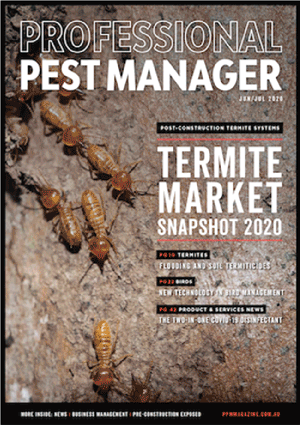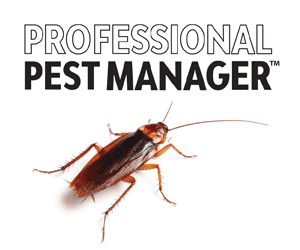PEST INSIDER: In this feature, we share stories from pest managers and leading figures within our industry to give you an insight as to how they deal with the various challenges of the pest control industry.
Formerly a head chef, Ben Hansen (main picture) had been in the hospitality industry for 12 years – a gig that kept him busy working countless hours, including nights and weekends. “My wife Lara said, ‘You’re miserable to be around; find another job,’” he recalls. “So, I changed trades and got a job with a company called ProPest.”
Since that day, Mr Hansen hasn’t looked back. In 2009, three years after that life-changing decision, the couple acquired ProPest Pest Management and ventured into the world of pest control as business owners.
They initially worked 24/7 as a two-person team, but eventually the hard yards paid off. Today, the Rockhampton- based, central Queensland company has a large team of technicians and three arms: pest control, first aid/ compliance training, and industrial cleaning at mine sites. Ms Hansen wears many hats as the director, chief financial officer and HR manager, while Mr Hansen – never satisfied with remaining still – focuses on finding new avenues for business growth. “I like to think of it as ‘performance- based punishment’,” he says. “The better you do, the more you get to do, which is actually very rewarding.”
Rewards don’t come without challenges though, especially in rural Queensland. For starters, coordinating farm and mine jobs across large distances means technicians can drive up to 350km a day.
Each job also requires a fair degree of problem solving, not to mention attention to detail and extensive knowledge on how to target specific species. Mr Hansen and his team have faced plenty of tricky situations, from eradicating termites that climbed up 75m of Telstra conduit, to removing 37 pigeons and 1,300kg of faecal matter from a customer’s roof cavity. “Six months down the track, everyone’s health has improved in that house. Removing the pigeons, faeces and bugs has completely changed their lives,” Mr Hansen explained.
One of his most memorable jobs, though, was discovering a nest of termites living in the same area as a swarm of valuable bees during an inspection.
“We found termites living out the back of the client’s house in Rockhampton, but she didn’t want to kill the bees that lived in the same area. They were her pride and joy; she’s had them for years.”

Mr Hansen was determined to make his customer happy, believing that “only ten per cent of what we do is the actual job. Ninety per cent of what we do is how we deal with the customer and relate to their problems.” To solve her termite problem, he decided to try Altriset, Syngenta’s non-scheduled termiticide.
“When any new chemical comes out, there’s lots of research available and you can find out a bit of its history,” said Mr Hansen. “I ran the product past the client and showed her all the literature. She made me swear black and blue that if I touched her bees, I would replace them! She was under the impression that chemicals kill everything and didn’t realise that products can be so selective these days.”


Thankfully the treatment was successful, with no sign of returning termites to date. For Mr Hansen, it’s outcomes like this that make pest control such a satisfying career.



